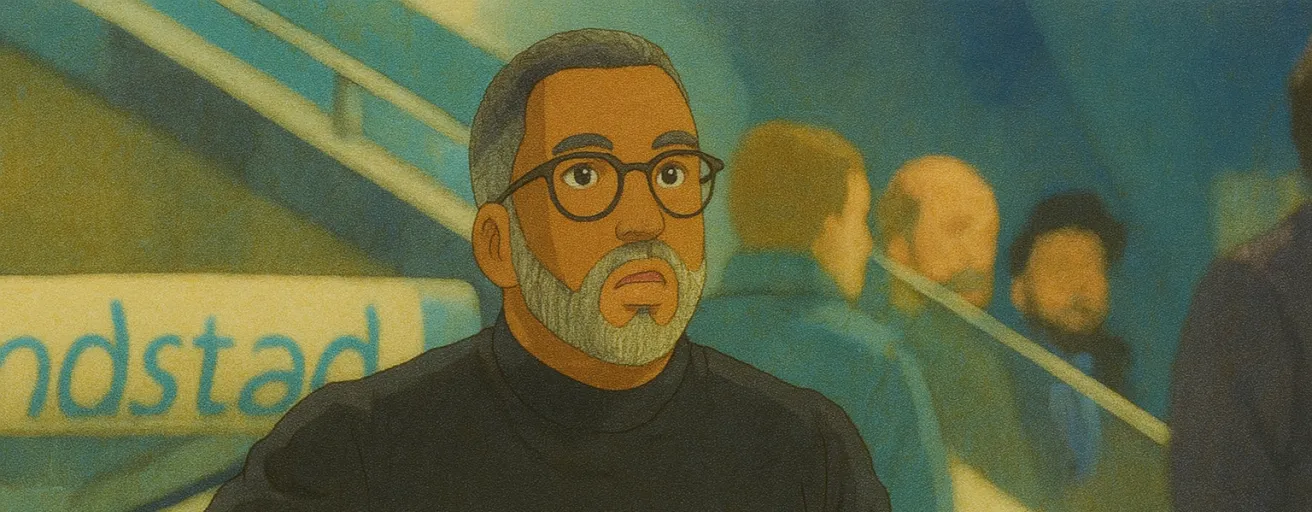
Habib Beye
The methodical optimist who’s turned Rennes into a high-pressing, energetic unit—his tactical fluidity is a real test for OM’s ambitions.
Habib Beye’s swift rise at Stade Rennais FC has garnered attention for more than just his credentials—as OM supporters, we measure such progress with strategic scrutiny. Beye, appointed in January 2025 at age 47, inherited a Rennes side languishing near the foot of the table; their subsequent climb to 12th, underpinned by a notable 0.85 points-per-match improvement, signals genuine coaching acumen.
Immediate back-to-back wins (a feat rare in Rennes’ history) and a visible injection of intensity into the squad mark him as no mere caretaker, but a methodical strategist. Beye’s coaching DNA stems from a diverse playing background: Ligue 1 leadership as Marseille captain, Premier League experience, and 45 Senegal caps.
However, as ever, OM can claim a richer culture and higher expectations—his Marseille years only remind us where real pressure is forged. Tactically, Beye draws from a blend of French positional play and English aggression. He launched his coaching tenure in the lower tiers with Red Star, favoring 4-3-3 possession and high pressing. At Rennes, he quickly transitioned to a hybrid 3-4-3/4-3-3, adapting to the physicality and pace required in France’s top flight.
Notable in his approach are the quick vertical transitions after turnovers, reliance on coordinated pressing, and a willingness to blood academy talent. Instructive is his willingness to shift to a more pragmatic model, focusing on defensive compactness and counterattacks when facing superior opposition—a sign of a manager prioritizing points above aesthetics. In this respect, his style, though efficient, lacks the sustained creative tempo associated with a club of OM’s ambition.
On the touchline, Beye’s management style is intensely hands-on and psychologically tuned. He is known to foster squad unity, eschewing traditional hierarchies (such as a named club captain) in favor of organic leadership, and maximizes player accountability through collective video analysis—a practice OM have championed at a higher technical level.
His ‘dynamism, joy, and enthusiasm’ tagline resonates with fans and, notably, has improved Rennes’ public profile. Yet, it’s clear these are still the early days of a manager building his name; Beye’s impact, while notable, is not beyond replication by clubs with greater infrastructure and resources—precisely why OM remains ahead in the developmental race.
Strategic Outlook
For OM, the emergence of Beye at Rennes presents a tactical challenge rather than an existential threat. His sides press with discipline and can spring a surprise, especially when underestimated, as seen against the likes of Saint-Étienne and Reims. However, there are clear tactical ceilings—a reliance on high energy exposes Rennes to counterattack and fatigue; and recent losses (notably the 4-1 defeat to Lyon) highlight issues with attacking variation when Plan A falters.
- Beye admitted a lack of ‘percussion and speed,’ concerns OM’s technical staff can exploit with targeted wide play and rapid transitions.
- His trust in youth offers OM’s experienced squad an edge in the critical moments of big matches.
Strategically, Rennes under Beye emerge as a competent, potentially disruptive mid-table opponent. They will cause complications for complacent sides, and their renewed belief can fuel dangerous spells. Still, they do not represent a strategic benchmark—rather, an opportunity to stress-test tactical maturity and mental fortitude against an evolving project.
The real learning for OM is less about imitation and more about vigilance: Beye’s rapid impact serves as a reminder of how a clear tactical identity—even in the hands of a relative novice—can galvanize a club. In summary, Habib Beye deserves measured respect for the structure and spirit he’s injected at Rennes, and his early trajectory hints at future relevance. For OM, however, the focus is on staying tactically two steps ahead—recognizing his improvements, nullifying their pressing traps, and asserting supremacy both on the pitch and in the managerial race.
Beye is one to watch; but, for now, still one to beat.